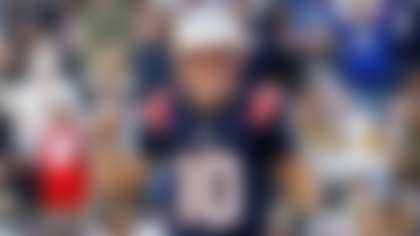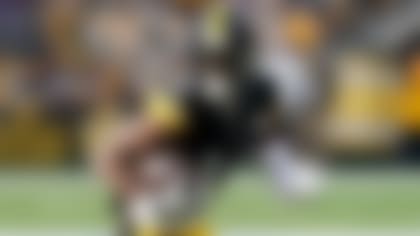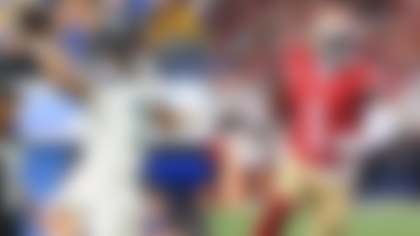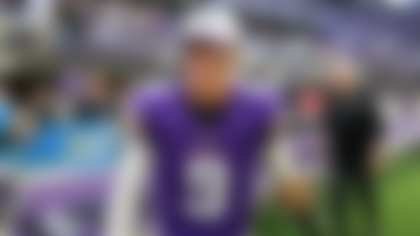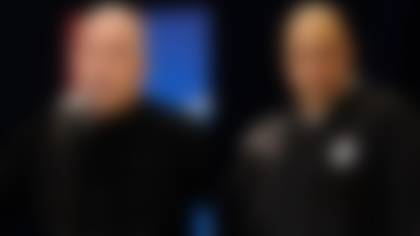EAST RUTHERFORD, N.J. -- In the first few minutes of his very first practice last week, Davis Webb was already performing the kinds of drills he'll probably be executing for the bulk of his rookie season: Going through one dropback after another, with a nearby coach exaggeratedly bending his knees and demonstrating the stride he wanted from Webb.
So goes the grooming of a future franchise quarterback, or at least the most serious attempt the New York Giants have made at molding one since Eli Manning alighted on the Meadowlands and delivered two Super Bowls.
There are flash cards to speed the absorption of the playbook ... and an emphasis on lower-body mechanics to refine his accuracy ... and a lot of excited anticipation about Webb's strong arm being able to spin passes through the notorious winter wind in New Jersey. Webb, a third-round draft pick, is not now -- and might never become -- the quarterback Manning is. But what he represents, in his first days on the job, is the Giants' best hope for a smooth transition to their next generation.
Webb is the Giants' highest-drafted quarterback since they selected Philip Rivers in the first round of the 2004 NFL Draft, then flipped him for Manning. It is not just his draft placement, though, that makes Webb a viable heir apparent -- it is his timing. Manning is 36 and has been remarkably durable, making every regular and postseason start since he became the starter in the 10th game of his rookie season. The Giants have enjoyed an extraordinary luxury that has allowed them to forego thinking much about Manning's successor: Only two quarterbacks in history -- Brett Favre and Eli's brother, Peyton -- have started more games in a row.
But the struggles of the Giants' offense in 2016 led to inevitable and pointed questions about whether Manning's decline had begun. That projection might still prove to be overly bleak. The offense, after all, had an almost non-existent running game and inconsistent offensive line play, and it was often painfully predictable. Key additions this offseason in receiver Brandon Marshall and rookie tight end Evan Engram should help. Still, even general manager Jerry Reese said Manning is on the "back nine" of his career and acknowledged at the start of the offseason that it was time to start contemplating life after Manning.
That future is not expected to arrive anytime soon. Manning has three years remaining on his contract. Meanwhile, Webb is far enough from being ready -- with a steep learning curve to navigate from the University of California's spread offense -- that the pressing concern with Webb's arrival is not the creation of a quarterback controversy, but rather, how the Giants will find enough snaps for a player who almost certainly will be third on the depth chart (behind Geno Smith) to become comfortable in Ben McAdoo's timing-based West Coast offense.
Webb spent the months before the draft and the two weeks before he reported for rookie camp with former NFL quarterback and head coach Jim Zorn. Zorn began Webb's West Coast education from the ground up -- focusing on reading defenses and understanding protections. When Webb finally reported to the Giants, they handed the rookie a playbook, and he retreated to the hotel room he shared with Engram to get to work.
"Let's get after it," Webb said to the assembled media, after being asked how he first reacted to getting the playbook. "I want to make it like my baby. I want to make sure that this is my thing, I want to treat this right and I want this to be my only part of life that I am focusing on, and really dive in and get focused with it and learn it like it is the back of my hand, because that is the most important thing for a quarterback."
Webb shrugs off the burden of having to master the physical and mental challenges of the West Coast offense. The son of a Dallas-area high school football coach, Webb was drawing up plays he saw on television on index cards as a young child, played at two different high schools and two colleges (Texas Tech, before his one year at Cal). He understands the demands of learning new systems and quickly ingratiating himself to teammates -- the flash cards are his idea, and after he was drafted, Webb went on YouTube to glean ideas for how he could improve. At Cal, he was named a team captain within weeks of his arrival on campus and then threw 37 touchdown passes. He has already been texting Manning with questions about the offense.
How the Giants landed Webb is unusual. Neither McAdoo nor offensive coordinator Mike Sullivan met Webb before the draft, in large part because vice president of player evaluations Marc Ross thought Webb -- who was not expected to last beyond the second round and had garnered some first-round buzz as the draft approached -- would be gone before the Giants were in position to draft him. That left them in getting-to-know-you territory even at rookie camp -- Sullivan's initial impression was that Webb is tall (6-foot-5) and has a good handshake.
What captured their attention before the draft were the leaps Webb made along the way, improving from his Cal game film (where his statistics in the team's Air Raid offense were similar to Jared Goff's) to the Senior Bowl (where he arrived two days early to practice with the receivers and emerged as the game's most outstanding player). Webb improved further before the NFL Scouting Combine when he worked with Zorn on, among other things, taking the snap from under center. It all suggested that Webb is very much a work in progress, with a high ceiling still to be reached. The Giants feel many of his throws at Cal were all arm strength, for example. Consequently, as indicated by his early drills, they are focusing on teaching him about stepping into throws to generate more power, which should improve accuracy, one of his red flags.
"Really, you have a chance to just teach him install one and introduce him to the system, so that he is familiar with how we adjust things," McAdoo said about Webb's early lessons. "Maneuvering through the playbook, fundamentals are big, talking to him in today's day and age about how we get away from center, how we receive the ball and just different things fundamentally, but a lot of stuff under center for him."
For now, that is enough for Webb and the Giants. Webb joked that he does not want to be that annoying rookie who pesters a veteran like Manning, but he does want to be a sponge when he watches Manning work. Webb will be deep on the depth chart this season, but this draft, some part of Reese's tenure and a significant portion of the Giants' future will be measured by whether Webb can progress from sponge to successor.
Follow Judy Battista on Twitter @judybattista.


